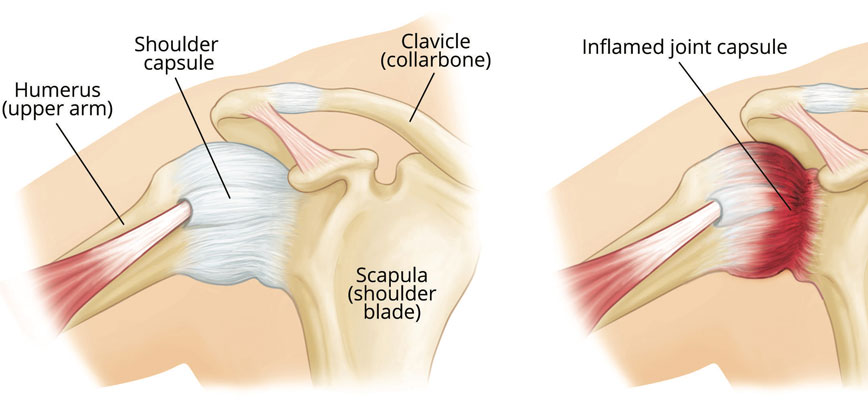FROZEN SHOULDER
The structure of our shoulder is as formed as a ball-and-socket joint. It is made up of three bones which are, the upper arm (humerus), shoulder blade (scapula), and the collarbone (clavicle). The tissue surrounding our shoulder joint holds everything together. This is called the shoulder capsule.
When this capsule becomes so thick and tight, we face difficulty moving our shoulders. This condition in which pain and stiffness are usually involved is called a frozen shoulder. Frozen shoulder, also known as adhesive capsulitis. It is a condition that affects your shoulder joint.
If you’re suffering from a frozen shoulder, you may feel uncomfortable while simply dressing and undressing, sleeping, and performing other activities. You can consult our physical therapist to guide you through exercises and treatment options.
The Signs and symptoms of frozen shoulder develop gradually, get worsen over time and then finally resolve within one to three years.
SYMPTOMS OF A FROZEN SHOULDER
If you have a frozen shoulder, you’ll likely feel achy pain in one shoulder. You can also feel the pain in the shoulder muscles that wrap around your arm. Your pain might get worse at night and disturb your sleep. It becomes difficult or impossible to move your shoulder.
Frozen shoulder develops slowly in three stages. Each has its own unique timeline. You need to perform given exercises at a specific stage of your frozen shoulder.
Freezing stage:
- Any time you move your shoulder it causes pain.
- The range of motion becomes limited.
- This can last anywhere from 6 to 9 months.
 Frozen stage:
Frozen stage:
- Your pain might get better than in the previous stage.
- However, your stiffness gets worse.
- Moving your shoulder becomes more difficult and harder to get through daily activities.
- This stage can last 4-12 months.
Thawing stage:
- You can feel improvement in the range of motion.
- This can take anywhere from 6 months to 2 years.

FROZEN SHOULDER CAUSES
Frozen shoulder occurs when the capsule thickens and tightens around the shoulder joint, and it restricts the shoulder’s movement. Frozen shoulder happens more often in women than men, between the ages of 40 and 60.
Certain medical conditions like a stroke, or surgery can increase your risk too. If you have diabetes, you will be more likely to get frozen shoulders. Some medical problems such as heart disease, thyroid disease, or Parkinson’s disease are linked to frozen shoulder, too. Learn more about the different causes and symptoms of shoulder pain.
TREATMENT TO OVERCOME FROZEN SHOULDER PROBLEM
There are remedies for the frozen shoulders that may help you relieve the pain and help you get your shoulders back into motion. Most frozen shoulder treatment controls shoulder pain and maintains movement of the shoulder as possible.
Medications
Over-the-counter non-steroidal anti-inflammatory drugs (NSAIDs) such as aspirin or ibuprofen can help reduce pain and inflammation associated with frozen shoulders. In some cases, your doctor might prescribe a stronger pain-relieving medication.
Physical Therapy
Physical therapy might be a part of your treatment. Your physical therapist can teach you multiple range-of-motion exercises. These exercises help recover mobility in your shoulder. The strengthening and stretching exercises are important to improve your range of motion.
Surgical Procedures
Most frozen shoulders get better within 12 to 18 months. If your symptoms are intense or don’t improve over time, you might need some surgical treatments. Your doctor may suggest:
- Steroid injections – Injecting corticosteroids into your shoulder joint to reduce your pain and improve your range of motion.
- Joint distension – Injecting sterile water into your shoulder capsule can help stretch the tissue. Shoulder movement becomes easier.
- Shoulder manipulation – Surgeons would forcefully move the shoulder under general anesthesia. So, you may become unconscious and feel no pain. Then the doctor moves your shoulder joint in different directions, to help loosen up your shoulder tissue.
- Surgery – When any treatment hasn’t helped, your doctor may suggest surgery. Surgery for frozen shoulders is rare. The surgery is to remove the scar tissue and adhesions from inside your shoulder joint.

FROZEN SHOULDER PREVENTION
One of the most common causes of frozen shoulder is immobility. This immobility may happen during recovery from a shoulder injury, broken arm, or a stroke. To maintain the range of motion in your shoulder joint, discuss your condition of frozen shoulder with a doctor. Get detailed knowledge about exercises, how to do them at home, what are the things to be avoided, etc.
To prevent the situation from getting worse, it is indeed important to consult an expert. At Specialty Care Clinics, our specialists will guide you with the benefits of therapies and treatments. We take care of your health and help you recover.
Call (469) 545-9983 to book an telehealth appointment for an at home check-up.
